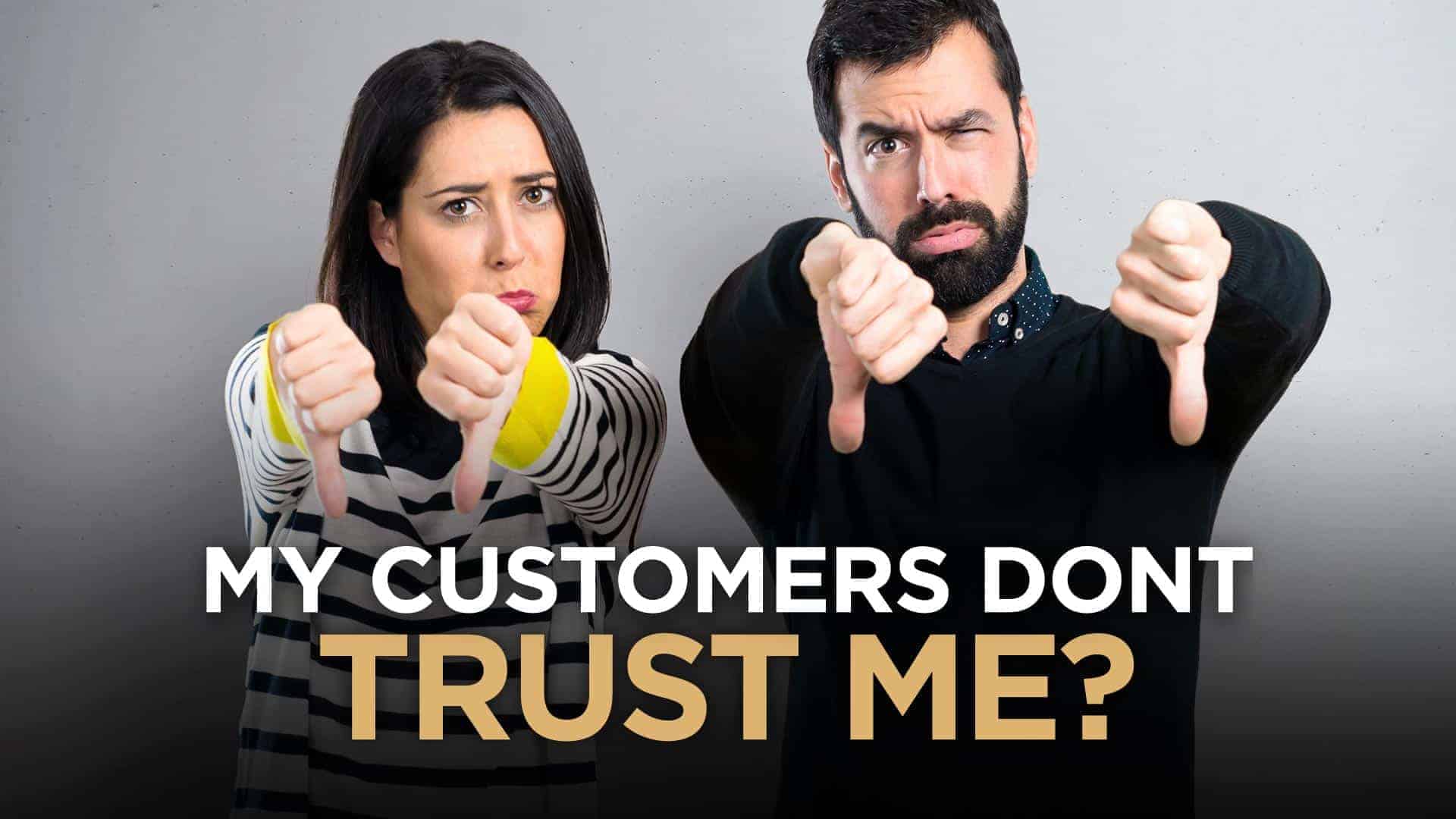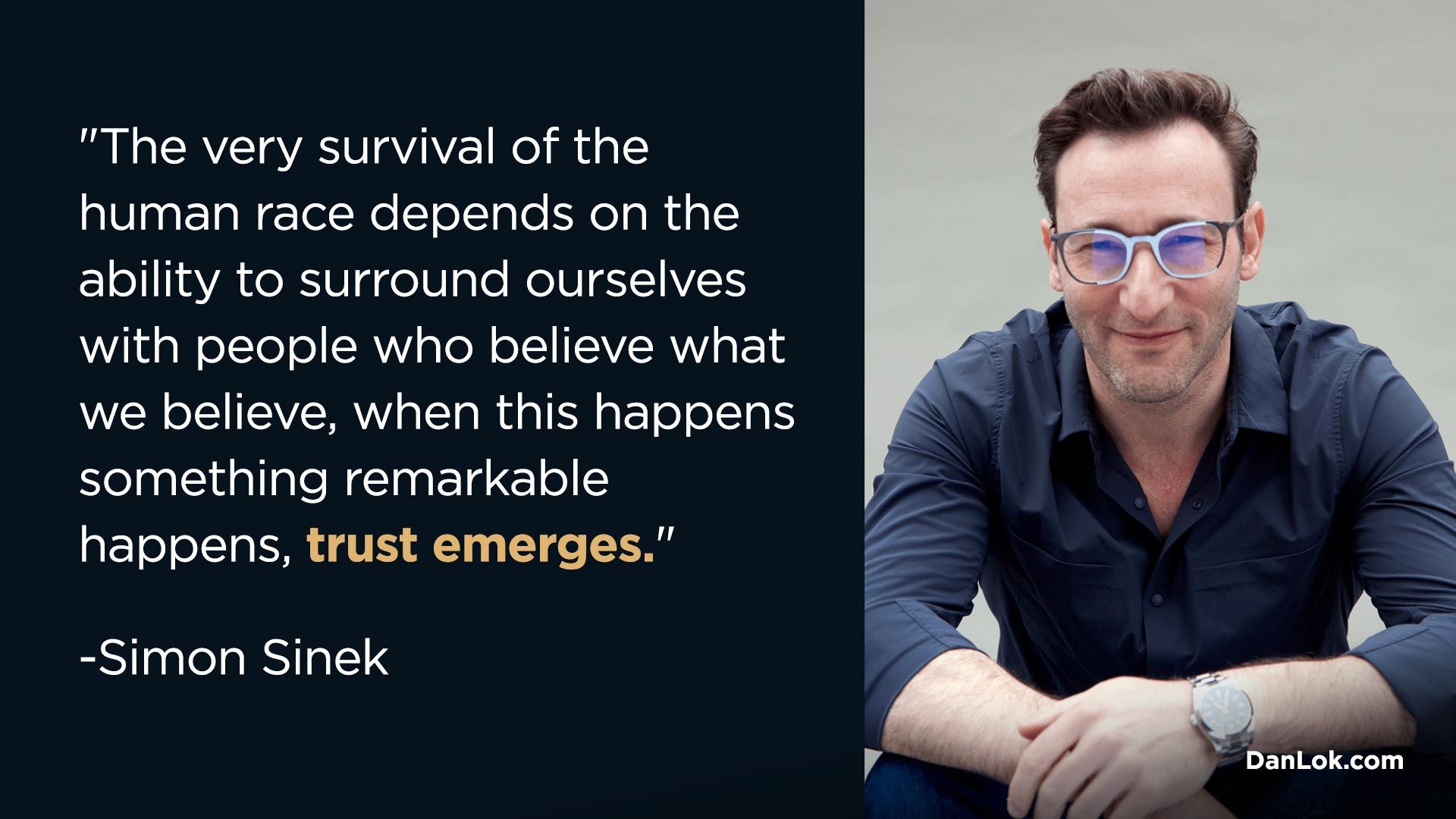“How come my customers don’t trust me?”
In any kind of relationship, trust means everything. It’s one of the most valuable currencies exchanged among humans. And the truth is, you should always assume your customers don’t trust you. In fact, they will not trust you until they have a good reason to trust you.
You can’t exactly blame them for their lack of trust in you or your brand. If you think about it, we can never be sure if we’re dealing with a good guy or a bad guy. There’s always a lingering shadow of doubt in every decision we make to trust.
Even as a child, we’re taught to stay away from strangers, which reinforces that doubt early on. And in the case we did meet a stranger, the rule was to always say, “No.”
But even under those circumstances, we also know trust is a powerful lubricant that enhances the right relationships with people. Everyone from top business leaders to academic researchers celebrate the power and virtue of trust. But if that’s the case, it still doesn’t answer the big question: “How come my customers don’t trust me?”
In this article, we’ll take a deeper look at why customers don’t trust you, how it affects businesses and brands, why it’s important, and what you can do to build trust. So let’s get started.
The REAL Reason Why Customers Don’t Trust You
Contrary to popular belief, the reason your customers don’t trust you actually has less to do with you and more to do with them. And here’s why. The human brain is not as reliable as we think it is. It’s really good at keeping us alive and maintaining our survival. But when it comes to making decisions, it doesn’t always act in our favor.
Like most people, we rely heavily on emotions when we make decisions. And unfortunately, we can make some terrible decisions based on our emotions and how we feel. According to a Harvard Professor, 95% of all our buying decisions are driven by the subconscious mind.
It doesn’t matter how much you compare different options in the marketplace and logically think through your buying decision. The reason you buy is largely influenced by your emotions. And you justify those decisions with logic.
For example, let’s say you once hired someone to help you invest in some stocks. They say they can 10x your ROI in a matter of a few weeks. The idea of making more money catches your attention so your brain serves up a bunch of reasons why it wouldn’t hurt to give it a try. But before all the justification, you actually already made your decision based on greed.
Now, after you paid this person to help you out, you later realized they didn’t do as they promised and refused to return your original investment. You go home frustrated and upset about the whole incident. And you tell yourself you’re not going to make this mistake again.
But is that really true?

Emotions Influence Your Decisions More Than You Realize
It turns out our emotions influence our decision making process more than we think. Even after you’ve thought through your mistake, relaxed and thought about it a little more, the same emotions will still influence your choices days, weeks, or even months down the road.
So let’s say you’re now shopping for some online courses on photography. But for some reason, you still feel the need to put your guard up and you’re not sure why.
The same feeling you felt after making that bad investment causes you to put your guard up again. It doesn’t matter that you’re buying something entirely unrelated. Your memory of those emotions is like a standard for future decisions.
So when you want to make another purchase, you can’t help but be wary because you know what it feels like to take on those risks. You know what it’s like to lose trust in a person. And those emotions are ingrained into your subconscious mind.
This happens all the time and sometimes they’re emotions you don’t remember. Well, your customers often experience the same thing. It is one of the main reasons why it’s hard for them to trust you. The next time you ask, “How come my customers don’t trust me?”, you’ll know why.
Consumer Trust Can Make Or Break Your Brand
Have you ever come across a brand or even a personal brand you were very loyal to? Maybe it’s a brand that you identify with. Or maybe you really resonated with a brand’s message.
This is not a coincidence. Great brands and businesses understand the power of customer trust. It is in a sense “the life force” of a brand because people buy people. They buy from those they like, know, and trust. And that’s what makes a brand so powerful.
A customer’s trust in a brand is more important today than ever. There is so much noise in the marketplace and people are bombarded with so many options, it’s impossible to count.
Before the rise of the internet, people often only had to choose among a handful of brands. But now, they’re forced to choose from a global mix of thousands upon thousands of different brands. As a consumer, they’re trying to figure out who they can trust. From a brand perspective, how can you differentiate yourself from the mix? What makes you stand out?

Apple’s Secret Sauce To Brand Loyalty
Here’s a perfect example of a brand that knows how to stand out: Apple.
With every new iPhone or Macbook Apple introduces to the world, there are millions of shoppers who can’t wait to get their hands on these products. But while many of Apple’s devices come and go, there’s one thing that never changes and it’s Apple’s secret formula for great brand trust.
Apple’s super-power is their ability to build relationships with people. But we’re not just talking about their customers. We’re talking about “their people” – the people they work with. The way Apple trains their team to engage with their customers is their secret to building trust.
Here’s how they do it. They used The Ritz-Carlton way of effective communication and tweaked it to fit their brand. Their employees are trained to follow this five-step acronym called A-P-P-L-E from the moment a customer walks into the store and the moment they leave the store.
- Approach customers with a personalized warm welcome
- Probe politely to understand the customer’s needs
- Present a solution for the customer to take home today
- Listen for and resolve issues or concerns
- End with a nice farewell and an invitation to return.
Carmine Gallo, a senior contributor at Forbes, has studied the Apple Store Brand and has spoken to many former Apple leaders. And he believes the APPLE acronym works well because it doesn’t label the customers as “consumers.” It presents them as people.
So when “people” walk into the Apple Store they’re buying from someone who makes them feel special. They’re buying from someone who takes the time to give them a unique and personalized experience. And that’s what drives people to come back for more.
3 Rules For Building Strong Trust With Customers
When you ask, “How come my customers don’t trust me?”, a lot of it has to do with learning about human psychology. Simon Sinek said it best, “if you don’t understand people, you don’t understand business.” And he’s right. Because on an emotional level, people do not want to buy stuff.
They’re not buying their way into something. They’re buying their way out of something. For example, people buy gym memberships because they want to lose weight. Or they decide to go on a cruise vacation to escape their stressful work environment.
But beyond that, they want to build relationships with people they can trust and can help them achieve their desires. This need for trust is actually deeply ingrained into human DNA.
According to the Harvard Business Review, “It all starts with the brain. Thanks to our large brains, humans are born physically premature and highly dependent on caretakers. Because of this need, we enter the world “hardwired” to make social connections…We’re social beings from the get-go: We’re born to be engaged and to engage others, which is what trust is largely about.”
Today, more and more business leaders are asking this question: What do my customers want? And they very well should. We live in a time where people expect more and demand more. But what they want is not more stuff. What they want is an experience rooted in building trust.
Here are three rules to help you build strong trust with your customers.
Rule 1. Focus on Developing Trust with the People That Matter The Most
According to the wise words of Simon Sinek, “The very survival of the human race depends on our ability to surround ourselves with people who believe what we believe. When we’re surrounded by people who believe what we believe, something remarkable happens: Trust emerges…
Trust is a feeling-a distinctly human experience. Simply doing everything that you promise you’re going to do does not mean people will trust you. It just means you’re reliable. Trust comes from a sense of common values and beliefs…
And the reason trust is important is because when we are surrounded by people who believe what we believe, we’re more confident to take risks. We’re more confident to experiment, which requires failure. We are more confident to go off and explore knowing that there is someone we trust and who trusts us, will watch our back.”
Most people would agree that your customers are the people that matter the most. You always hear people say your customers should be a priority and they should always come first. And it’s true. They are important but they’re not the most important.
The people that matter most are the people you work with – your team. They are the reason your business can function every day. Without them, you wouldn’t be able to run the business much less grow it. So in order to build trust with your customers, you have to build trust within your team and put their interests ahead of your own.
What Navy SEAL Team Strategies Can Teach Us About Trust
Let’s say you’re a member of the Navy SEAL. You and your team are on a mission to attack a target. Before you go attack, you send one of your teammates to go scout the area to see how many enemies are out there. They come back and tell you there are only five enemies in the area. You trust the information and plan to send out only three people. But when you and your three teammates get there, you realize there are actually ten enemies.
Even though you trusted the information wholeheartedly, you don’t have time to go get extra backup so you head in any way. But knowing you’re outnumbered, you tell your team, “Someone’s going to die. Not everyone is going to come back because someone will have to make a sacrifice.”
Now you have one of two choices. As the leader, you could sacrifice the life of one of your teammates and tell them to go get shot. If you do that, then the remaining two members will refuse to follow you and the mission will be over. Why? Because you chose to put your life ahead of the team and broke the trust. When you break the laws of trust, you no longer have the right to ask, “How come my teammates don’t trust me?”
The second option you have is to tell your team, “Hey guys, chances are some of us are not going to make it. I don’t know what’s going to happen but here’s what we’re going to do. This is the plan. So we have ten enemies. We have this much ammunition and we’re going to take these positions. But I’m going to be leading from the front and I’ll be the first person to step outside this door. We’re going to be in the middle of bullets and bombs but this is the best plan I can define. I want to get us home safely but I cannot guarantee it. So are you with me?”
If everyone comes back safely, then great. If there’s a casualty, then you did your best. But as a leader, your chances of survival are highest if you are the first one to lead the team out and everyone works together.
The same principle applies to any business. When you put your team’s interest ahead of your own, you’ll be able to build trust and loyalty among your team. And when you have the support of your team, you’ll have an easier time earning trust from your customers.
Rule 2. Cultivate Consumer Trust Through Transparency and Authenticity
People have greater expectations and demand more transparency from brands. Studies have shown that 94% of people say that a brand’s transparency is important to their purchasing decisions.
But if there’s one thing people have in excess supply, it’s choices. They have the option to buy on their own terms and timetable. They can buy whatever they want, wherever, and whenever.
The downside is that it leaves more room for people to make bad buying decisions which then leads to distrust. And the bright side is that you can establish yourself as an authority brand by being honest and transparent.
This simply means educating your customers with reliable information and helping them come to their own informed buying decision. This is how you stand out from the crowd and establish what you stand for.
Southwest Airlines sets a great example of being transparent about their values and beliefs. They’re one of the major U.S. airlines and pride themselves on being the world’s largest low-cost carrier.
They ran a marketing campaign back in 2015 called “Transfarency” to demonstrate their promise to their customers. The promise to treat their customers honestly and maintain their low-price fares.
But they don’t stop there. They also added storytelling to their “Transfarency” campaign. And storytelling is one of the most powerful ways to connect with people on an emotional level.
Southwest Airlines’ vice president and chief marketing officer, Ryan Green, said, “We’re focused on telling customer-centric stories. In addition to talking about our unique differentiators, we want to show customers why we do business the way we do.” The “Transfarency” was so successful it gathered nearly 5 million likes on Facebook alone.
As a brand, if you can communicate your message in a way that people can feel your honesty and transparency, you’re more likely to gain their trust. So before you jump the gun and ask yourself, “How come my customers don’t trust me?”, you should go back and look at how you’re communicating your message to your customers.

Rule 3. Commit to Consistency At All Times
How would you feel if you walked into a Starbucks and the barista got your iced, ristretto, 10 shot, venti, with breve, 5 pump vanilla, 7 pump caramel, and 4 Splenda wrong?
You might say to yourself, “My order is super complicated anyway.” And you’ll continue to go about your day as if nothing happened. Now, what if you went to a different location the next day and the barista got it wrong again? You’ll start to feel a little uneasy.
A big part of Starbucks’ promise to their customers is that you will receive a customized beverage that perfectly suits your taste and dietary preferences. It doesn’t matter how detailed or complex your orders are, you can rely on Starbucks promise. But how many times would you be willing to accept inconsistency in your order?
You see, most people are very unforgiving. With the wealth of choices you have at the touch of your fingertips, you can switch from one brand to the next in an instant. You may have been loyal to Starbucks for years, but if the brand is inconsistent in delivering their brand promise, your trust in Starbucks could change very fast.
Branding is the best way to separate yourself from the crowd. But if you don’t consistently live up to it, you will lose customer trust and your branding efforts will be pointless.
So if you want to put an end to your concerns and stop asking yourself, “Why don’t my customers trust me?”, you need to focus on consistently delivering your brand promise throughout your customer’s buyer journey.
It’s Not Too Late To Regain Trust With Your Customers
If you’ve read this far, you can probably see that the dynamics of trust are very delicate. It’s easily lost when we feel hurt or betrayed by another person’s actions. But in the same way, it can also be regained by understanding how you can rebuild trust.
Being reliable, transparent, and consistent are all essential to regaining trust with a customer. But without effective communication, it would still be challenging to accomplish. Establishing trust comes back to being able to listen and to ask the right questions so you can figure out why customers don’t trust you and how you can go about fixing it.
If you want to find out how you can leverage the power of effective communication so that you never have to wonder why customers don’t trust you, then click here to get the Perfect Closing Script.





